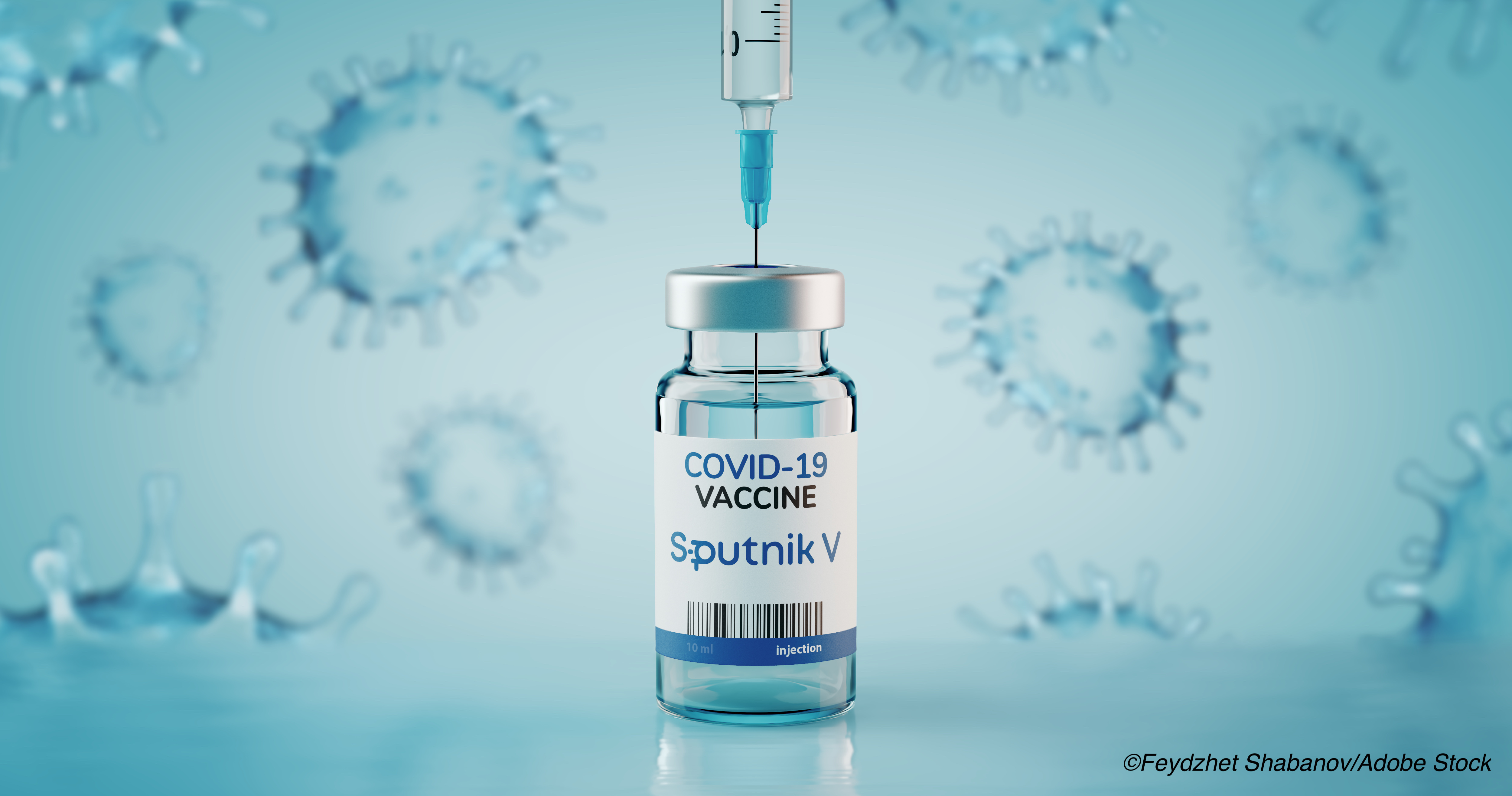
Peer-reviewed, interim phase III data from a trial of a Covid-19 vaccine developed in Russia showed an overall efficacy of 91.6%, with protection shown across all age groups.
The trial data for the Sputnik V Covid-19 vaccine, also known as the Gam-Covid-Vac, involved 20,000 participants vaccinated in Moscow last fall, with three-quarters randomized to receive the active adenovirus vector vaccine and one-forth receiving placebo vaccines.
The vaccine is unique in that it includes two adenovirus vectors — rAd26 and rAd5 — modified to express the SARS-CoV-2 spike protein and weakened to render them unable to cause Covid-19. Study participants in the active-vaccine group received one dose of rAd26, followed by a booster dose of rAd5 three weeks later.
The interim findings from the ongoing study, published online Feb. 2 in The Lancet, showed the two-vector vaccine to be 100% effective for preventing moderate or severe disease, wrote lead researcher Denis Y. Logunov, DSc, of the Gamaleya National Research Center for Epidemiology and Microbiology, Moscow, Russia, and colleagues. The researchers are currently examining the efficacy of the vaccine when given as a single dose.
Russian officials were widely criticized last August when they approved the vaccine for emergency use before phase III trials had even begun. Among the critics was Dr. Anthony Fauci, director of the Naitonal Institute of Allergy and Infectious Diseases, who conveyed his dismay to the New York Times at the time.
“If we wanted to take the chance of hurting a lot of people or giving them something that doesn’t work, we could start doing this, you know, next week if we wanted to,” he told the newspaper in August.
Researchers Ian Jones of the University of Reading, Reading, U.K., and Polly Roy of the London School of Hygiene & Tropical Medicine, London, commented on the newly published interim findings and the controversy in The Lancet.
“The development of the Sputnik V vaccine has been criticized for unseemly haste, corner cutting, and an absence of transparency. But the outcome reported here is clear and the scientific principle of vaccination is demonstrated, which means another vaccine can now join the fight to reduce the incidence of Covid-19,” they wrote.
As of Jan. 23, more than 2 million doses of the vaccine had been administered in Russia outside of clinical trials, mainly to at-risk populations, medical workers, and teachers, Logunov and colleagues wrote.
The interim trial data included adults with negative SARS-CoV-2 polymerase chain reaction (PCR) and IgG and IgM tests at enrollment and no other vaccinations in the 30 days before receiving the Covid-19 vaccine, who were assigned (3:1) to receive the Sputnik V vaccine or placebo, with stratification by age group.
Both the first rAd26 dose and the second rAd5 dose were administered at doses of 0.5 mL, and both vectors carried the gene for the full-length SARS-CoV-2 glycoprotein S. The primary outcome was the proportion of participants with PCR-confirmed Covid-19 from day 21 after receiving the first dose.
Between early Sept. and late Nov. of last year, 21,977 adults were randomly assigned to the vaccine group (n=16,501) or the placebo group (n=5,476), including 19,866 who received two doses of vaccine or placebo and were included in the primary outcome analysis.
From 21 days after the first dose of vaccine (the day of dose 2), 16 (0.1%) participants in the vaccine group and 62 (1.3%) in the placebo group were confirmed to have Covid-19; overall vaccine efficacy was 91.6% (95% CI, 85.6–95.2). In addition, there were no cases and 20 cases of moderate or severe Covid-19 in the vaccine and control groups, respectively, indicating an efficacy of 100% for moderate or severe disease (95% CI 94.4-100.0).
The vaccination adverse events most frequently reported were grade 1 (94.0% of total events) events. A total of 45 participants (0.3%) in the vaccine group and 23 (0.4%) in the placebo group had serious adverse events, but none were considered associated with vaccination, with confirmation from the independent data monitoring committee.
Four deaths were reported during the study (3 [<0.1%] in the vaccine group and 1 [<0.1%] in the placebo group), none of which were considered related to the vaccine.
In their commentary, Jones and Roy noted that the use of two varying serotypes, given 21 days apart, is intended to overcome any pre-existing adenovirus immunity in the population.
“Among the major Covid vaccines in development to date, only Gam-Covid-Vac uses this approach; others, such as the Oxford-AstraZeneca vaccine, use the same material for both doses,” they wrote.
They pointed out that a vaccine for Ebola virus developed at the same Moscow research center used a similar two-vector approach “and the general principle of prime boost with two different vectors has been widely used experimentally.”
They concluded that the over 90% vaccine efficacy that occurred on day 21 after the first dose of the vaccine is “particularly encouraging for current dose sparing strategies.”
- Peer-reviewed, interim phase III data from a trial of a Covid-19 vaccine developed in Russia showed a 91.6% efficacy, with protection seen across all age groups.
- The vaccine is unique in that it includes two adenovirus vectors — rAd26 and rAd5 — modified to express the SARS-CoV-2 spike protein and weakened to render them unable to cause Covid-19.
Salynn Boyles, Contributing Writer, BreakingMED™
This research was funded by the Moscow City Health Department, Russian Direct Investment Fund, Sberbank, and RUSAL.
Several study researchers, including Denis Lagunov, reported holding patents for an immunobiological expression vector, pharmaceutical agent and its method of use to prevent Covid-19. The editorial writers’ declared no competing interests.
Cat ID: 31
Topic ID: 79,31,730,933,31,926,192,927,925,934


Create Post
Twitter/X Preview
Logout